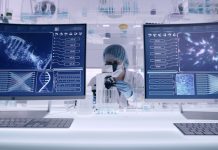The promise of connected care has expanded the opportunities for how clinicians and patients interact, offering care from a distance and creating a shift towards more accessible systems
Spurred on by the pandemic, patients have shown an appetite for remote healthcare models such as virtual consultations, healthcare apps and telemedicine made possible by increasing connectivity. Now, researchers are looking to connected care, an integrated approach to connectivity and patient care.
As computing power ramps up and data volumes surge with the likes of real-time data from wearable devices being integrating into medical records, the possibilities for innovation are both growing and becoming increasingly more complex.
The impact of connected care will be transformational
If successfully realised, the impact of connected care will be transformational. Patients will be better educated and engaged, benefitting from greater coordination of care across their journey. Meanwhile, clinicians will be equipped with valuable tools to maximise their time, make more informed decisions and improve patient health outcomes.
For example, diagnostic at-home devices are already being leveraged in a bid to deliver continuous care as well as data analysis capabilities driving the triage process, where chatbots determine whether patient queries need to be escalated to care teams.
But the time and resource savings from these applications just scratch the surface of what’s possible when digital initiatives are accelerated.
£21 million to roll out AI in the NHS
As it advances at pace, AI (artificial intelligence) has also been harnessed in pharmaceutical trials to supercharge the discovery of new antibiotics as superbugs grow more resistance to treatment, as well as recent trials to detect blood clots in patients faster and more accurately than doctors.
With the recent announcement that £21 million is being invested in rolling out AI in the NHS, these developments in connectivity are set to mature in the mission to enhance care by preventing ill-health, as well as supporting earlier diagnoses, more effective treatments, and faster recovery.
With AI in the NHS playing a fundamental role in generating synthetic data too, these investments will drive ongoing optimisations for how care is delivered – giving the industry the means to expand use cases without putting sensitive patient data at risk.
But beyond building a foundation for digital growth, facilitating this new healthcare frontier relies on innovation that encourages a patient-first approach. In a survey of respondents in the European Union, 25% reported they would fully trust AI enabled decisions for patient monitoring applications, and a further 69% of people indicated that they would trust AI-driven results when combined with expert judgments.
69% of people state they would trust AI-driven results when combined with expert judgments
While it’s clear that trust in technologies is building, the human touch for specialised areas of healthcare, such as complex medical decision making, patient education, communication and compassion, can’t be understated.
When each patient is surrounded by a complicated ecosystem, with different medical environments, cultural factors, individual preferences and care teams to consider, there’s no single approach that can be applied for adopting technologies such as AI and deep learning.
To deliver on the promise of digital health technologies, disparate sources of data need to be integrated throughout patient touchpoints and with greater consideration of personal needs. Once these interoperable digital systems have been established, healthcare professionals can ensure that they are harnessed in a way that augments their work.
Take advances in computing power with Exascale, for example, and its ability to create high fidelity digital twins of humans. These virtual models of patients comprise around 100 million living cells and entire organs, and can be used to simulate the effects of drugs and even diseases with 89% accuracy.
Striking harmony between technologies such as AI and human expertise
Opening the door to treatments that remove much of the guesswork from healthcare, they have the potential to ensure bespoke connected care.
Rather than relying on previous experience with similar, but non-identical patients, clinicians can uncover the most effective course of personalised care while focusing their attention on offering uniquely human interactions that can’t be achieved by technology, such as accounting for specific personal circumstances and offering guidance.
Ultimately, striking harmony between technologies such as AI and human expertise will be at the heart of making meaningful progress in healthcare. Seeing connectivity first and foremost as an investment in the patient will ensure that outcomes are nurtured in a way that doesn’t compromise the best interests of people.
This piece was written and provided by Jessica Rengstorf, MPH, Strategy Director (US Healthcare) & Adrian Sutherland, Strategy Director (Global Healthcare), at Endava.















